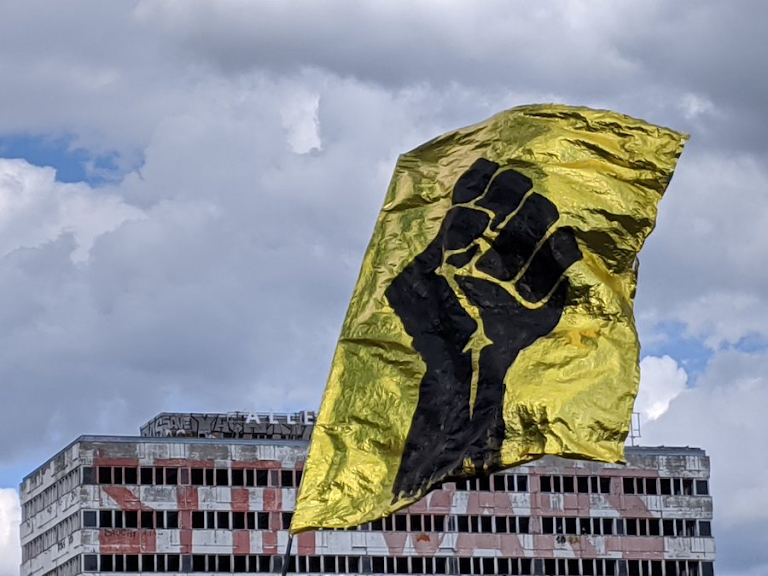
Public Statement Issued by theWorking Group Public Anthropology, German Anthropological Association
Drafted on 6 June 2020
Follow us on Twitter @AGPublicAnthro and Facebook
In the aftermath of the brutal police killing of George Floyd, nation-wide protests have erupted against police violence and structural anti-Black racism in the United States. In most major cities in Germany, massive demonstrations organized by BIPoC (Black, Indigenous and People of Color) and a supporting public are taking place. As engaged actors and witnesses of the contemporary, anthropologists in Germany cannot and should not stay silent and passive in the wake of one of the most significant anti-racist social movements in recent history. Neither can we afford to look away from Germany’s homegrown racism, systemic oppression, and structural discrimination against BIPoC communities intersecting with other minorities, vulnerable and underprivileged people.
While the German media are condemning police violence in the US, the unresolved cases of police violence, persistent racial profiling, and everyday racism in Germany (as well as in other European countries) and its central institutions hardly make it to the front page. Critical voices, for instance, have pointed out that the process that started in Germany with the NSU trial is unlikely to be finished until institutional racism in the country is faced and addressed accordingly. Spectacular acts of right-wing terrorism and populist politics have triggered public condemnation in recent years. But the everyday structural racism that BIPoC communities confront throughout their lives remains the hardest to disentangle from everyday white privilege. Institutionalized forms of racism have, for instance, systematically excluded BIPoC communities from employment and subjected them to racial discrimination, which has endured in Germany since colonial times. Decolonization calls for attention to the fact that coloniality is not over – that it is not ‘post-’ but rather continues to permeate almost all aspects of our lives.
As members of the German Anthropological Association, we condemn police violence and structural racism everywhere and stand in solidarity with the #BlackLivesMatter movement and BIPoC protests in the US, Germany, and elsewhere. We take this opportunity to call on the general public to intensify a critique and dismantling of white privilege maintained in Germany. We emphasize the need to reinforce the longstanding and unfinished project of decolonizing the colonial and imperial legacies. We demand a renewed commitment to affirmative action in supporting the BIPoC and other minority communities in Germany at all levels.
Each epoch of social movements has reconfigured the mainstream society as much as it has shaped anthropological theory and practice in the history of our discipline. Anthropology in Germany was rooted in colonialism, like elsewhere, and complicit with the Nazi regime supported by many German anthropologists and their unquestioned white privilege. German universities and our own discipline have largely failed in institutionalizing affirmative “inclusion” of BIPoC communities. Reworking our epistemologies and engaging in more collaborative forms of research are necessary steps in this direction. However, rhetoric gestures, methodological reforms, and “discursive” solidarity on social media, in classrooms and academic texts are not sufficient. In the wake of current events, we call on fellow members of the German Anthropological Association to express solidarity with the #BlackLivesMatter protestors and to recommit to the task that we demand from German society. Through a dual critique of the white privilege perpetuated in society and within our discipline with a renewed commitment to affirmative, practical action of solidarity in executing concrete plans of action can we, as anthropologists, join the public in their call for systemic change.
Supported by (in alphabetical order of the last name):
Judith Albrecht, Freie Universität Berlin
Christoph Antweiler, Universität Bonn
Diego Ballestero, Universität Bonn
Kathrin Bauer, Freie Universität Berlin
Bianca Baumann, Landesmuseum Hannover
Julia Nina Baumann, Freie Universität Berlin
Uli Beisel, University of Bayreuth
Carla Jaimes Betancourt, Universtät Bonn
Judith Beyer, Universität Konstanz
Isabella Bozsa, Städtische Museum Braunschweig
Anna-Maria Brandstetter, Johannes Gutenberg-Universität Mainz
Karoline Buchner, Freie Universität Berlin
Sandra Calkins, Freie Universität Berlin
Rukiye Canli, Universität Siegen
Caroline Contentin, Werkstatt Ethnologie Berlin
Rosa Cordillera Castillo, Humboldt Universität zu Berlin
Jeanine Dağyeli, Nazarbayev University, Nur-Sultan
Hansjörg Dilger, Freie Universität Berlin
Echi Christina Gabbert, Universität Göttingen
Felix Girke, HTWG Konstanz
Mirco Göpfert, Goethe-Universität Frankfurt am Main
Joachim Otto Habeck, Hamburg University
Nena Hedrick, Freie Universität Berlin
Isabel Heger, Freie Universität Berlin
Mayari Hengstermann, Universidad del Valle de Guatemala
Roger Horn, Freie Universität Berlin
Brandaan Huigen, Freie Universität Berlin
Carmen Ibáñez, Freie Universität Berlin
Daniele Karasz, ENSA Paris La Villette-LAVUE, Universität Wien
Omar Kasmani, Freie Universität Berlin
Erich Kasten, Kulturstiftung Sibirien, Fürstenberg/Havel
Lena Kaufmann, University of Zurich
Thomas Kirsch, University of Konstanz
Stephan Kloos, ÖAW Institute for Social Anthropology
Lotte Knote, Leibniz-Zentrum Moderner Orient
Madlen Kobi, Academy of Architecture, Mendrisio, Switzerland
Stefan Leins, Universität Konstanz
Claudia Liebelt, University of Bayreuth
Markus Lindner, Goethe-Universität Frankfurt am Main
Jasmin Mahazi, Leibniz-Zentrum Moderner Orient
Christoph Marx, Freie Universität Berlin
Dominik Mattes, Freie Universität Berlin
Maike Melles, Frobenius Institute, Frankfurt
Dominik Müller, Friedrich-Alexander-Universität Erlangen-Nürnberg
Frank Müller, Universität Bremen
Marcos Andrade Neves, Freie Universität Berlin
Minh Nguyen, Bielefeld University
Michaela Pelican, Universität zu Köln
Jean-Baptiste Pettier, Universität Bremen
Anita von Poser, Freie Universität Berlin
Ursula Probst, Freie Universität Berlin
Victoria Kumala Sakti, Max Planck Institute for the Study of Religious and Ethnic Diversity
Gertrude Saxinger, Austrian Polar Research Institute
Dominik Schieder, University of Siegen
Max Schnepf, Freie Universität Berlin
Michael Schönhuth, Universität Trier
Jannik Schritt, Technische Universität Berlin
Nasima Selim, Freie Universität Berlin
Sandro Simon, University of Cologne
Mareike Späth, Niedersächsisches Landesmuseum
Thomas Stodulka, Freie Universität Berlin
Andreas Streinzer, Goethe University Frankfurt am Main
Michelle Thompson, Albert-Ludwigs-Universität Freiburg
Magnus Treiber, LMU München
Tamara Turner, Max-Planck-Institut für Bildungsforschung
Julia Vorhölter, Universität Göttingen
Cordula Weißköppel, Universität Bremen
Angelika Wolf, Freie Universität Berlin
Andreas Womelsdorf, University of Vienna
Olaf Zenker, Martin Luther University Halle-Wittenberg
Supporting Working/Regional Groups of the German Anthropological Association:
Working Group Migration
Working Group Gender & Sexualities | Queer Anthropology
Working Group Medical Anthropology
Regional Group Indigenous North America
Working Group Environmental Anthropology
Working Group Anthropology & Education
Regional Group China
Regional Group Circumpolar North & Siberia
Regional Group Europe
Regional Group Africa
Working Group Psychological Anthropology
Regional Group South America
Regional Group Oceania
See here also the statement against police violence and anti-Black racism issued by the Association of Black Anthropologists (ABA), a section of the American Anthropological Association, and published on 6 June 2020.
Acknowledgments
We thank the Association of Black Anthropologists (ABA), a section of the American Anthropological Association, for allowing us to post here their statement against police violence and anti-Black racism. The original google document based on which our public statement has been crafted is closed now. We thank everyone for supporting the statement and the valuable feedback we received. It is possible to sign the document at a later period. Please contact us if you wish to do so:
Nasima Selim and Judith Albrecht
Email: nasimaselim@gmail.com, Judith.Albrecht@fu-berlin.de
Spokespersons, Working Group Public Anthropology
In Solidarity with #BlackLivesMatter and Call for Dismantling Structural Racism in Germany
Public Statement Issued by the Working Group Public Anthropology, German Anthropological Association
Drafted on 6 June 2020
Follow us on Twitter @AGPublicAnthro and Facebook
Mailing list: publicanthro-dgska@googlegroups.com
